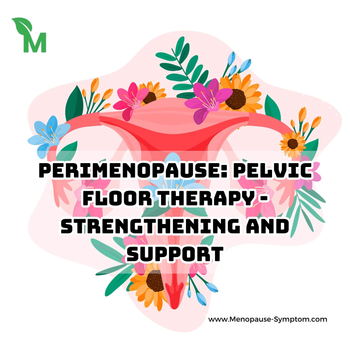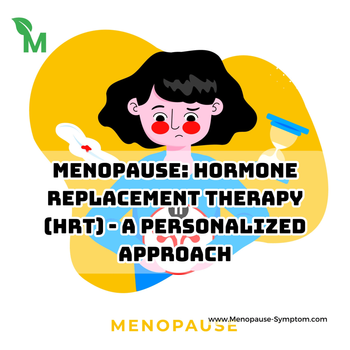Menopause: Cognitive Behavioral Therapy (CBT) For Menopause
On
07/10/2024Reading time:
10 min
Summary:
Menopause is a natural stage in a woman's life, usually occurring between the ages of 45 and 55. This is a time when the body undergoes many hormonal changes, leading to unpleasant symptoms.
Perimenopause can cause anxiety, sleep disturbances, and mood swings. For many women, these symptoms can impact their quality of life. There are many methods to help reduce these symptoms, one of the effective therapies to help cope with these changes is cognitive behavioral therapy (CBT).
What is CBT?
Cognitive Behavioral Therapy (CBT) is a commonly used therapy in modern psychological treatment. During therapy, you will work with a psychologist on a specific path. CBT helps you recognize incorrect or negative thinking patterns that exist in you. This allows you to think about and respond more effectively to situations you are facing.
CBT is a very useful method for treating mental health disorders. For example, depression, post-traumatic stress disorder (PTSD) or eating disorders. But people with normal mental health (or “normal people”) can still benefit from CBT. CBT is an effective method to help anyone learn to better manage stressful situations in life.
Application of CBT method
Cognitive behavioral therapy (CBT) has been shown to help women in menopause improve their mental and emotional health. CBT not only aims to reduce physical symptoms but also focuses on changing thinking and behavior. When negative emotions arise during menopause, CBT provides useful tools to help women cope and manage their daily lives.
One of the great benefits of CBT is that it focuses on identifying and changing false beliefs. Perimenopause often makes women feel like they are losing control, which can create a lot of anxiety. Instead of feeling this way, CBT encourages women to develop more positive and realistic thoughts about the changes in their bodies and minds. In this way, women can find confidence and peace during menopause.
For many people, attending therapy sessions is the first step to starting their healing journey. Sessions with a CBT professional often include discussion of personal experiences during menopause. This creates a safe space where women can share their feelings without feeling judged. Through this, they can realize that they are not alone in this journey and find support from others.
Some techniques in cognitive behavioral therapy include keeping a journal of your feelings, using breathing exercises and meditation, and engaging in physical activities. These techniques not only help reduce symptoms but also promote a sense of well-being. They also help improve overall health, which is especially important during menopause.
In addition, CBT can help improve stress management. During menopause, pressures from work, family, or relationships can be more intense. CBT offers specific ways to manage stress so that women can find balance in their daily lives. Developing positive habits can reduce anxiety and bring about a sense of well-being.
It is important to note that everyone responds differently to menopause. This means that there is no one-size-fits-all formula. CBT allows women to find individually tailored solutions. Through the process of self-discovery and solving psychological problems, women can realize their inner strength and move forward stronger.
When faced with a crisis during menopause, an indispensable tool in CBT is prevention. Prevention techniques help women prepare and respond to situations that may negatively impact their mood and feelings. Knowing about difficult situations in advance will help women feel more confident in facing and overcoming them.
On the other hand, participating in support groups is also an important part of cognitive behavioral therapy. Perimenopause can make women feel isolated and disconnected. Joining a support group gives women the opportunity to talk to others who have similar experiences. This sharing not only helps them cope with their emotions but also creates new friendships during menopause.
In addition, proper nutrition also plays an important role during menopause. Eating foods rich in vitamins, minerals, and fiber can help women feel more comfortable with the symptoms they will face. Advice from nutritionists combined with cognitive behavioral therapy form a comprehensive approach to dealing with these changes.
Regular exercise is also an effective method to help reduce menopausal symptoms. Activities such as yoga, walking, or swimming not only improve physical health but also have a positive impact on mood. When the body is active, hormones improve, reduce stress, bring a sense of happiness and relaxation to women during menopause.
Finally, the key to success in applying cognitive behavioral therapy for menopause lies in patience. The time it takes for you to see changes will vary from person to person. It is important to persevere and maintain positive habits. Gradually, women will notice changes in both their psychology and physical state, creating the foundation for a happier and more fulfilling life during menopause.
In conclusion, cognitive behavioral therapy (CBT) can provide many benefits for women during perimenopause and menopause. From changing their thinking to improving their mental health, CBT provides a clear roadmap for coping with and overcoming these challenges. Instead of feeling alone, the support and education in CBT will give women confidence in themselves and a more positive outlook on life. A new journey is ahead, and menopause can be the beginning of something new and exciting.
Source: Team MPS compiled, analyzed and wrote. Please dont reup without source. Many thanks.

Perimenopause: Pelvic Floor Therapy - Strengthening and Support
09.02.2024
Perimenopause and Body Changes
Menopause is a natural stage in a woman's life, usually starting between the ages of 45-55, that marks the end of her menstrual cycle and fertility.

Menopause: Hormone Replacement Therapy (HRT) - A Personalized Approach
09.02.2024
Menopause is a natural stage in a woman's life that marks the end of her menstrual cycle and typically occurs between the ages of 45 and 55.

Cold Water Therapy For Menopause: Refresh And Restore
09.02.2024
Listen to your body and find what works best to make menopause a positive experience, supporting your healthy and happy life. Start this journey with confidence, because you deserve the best in life!
